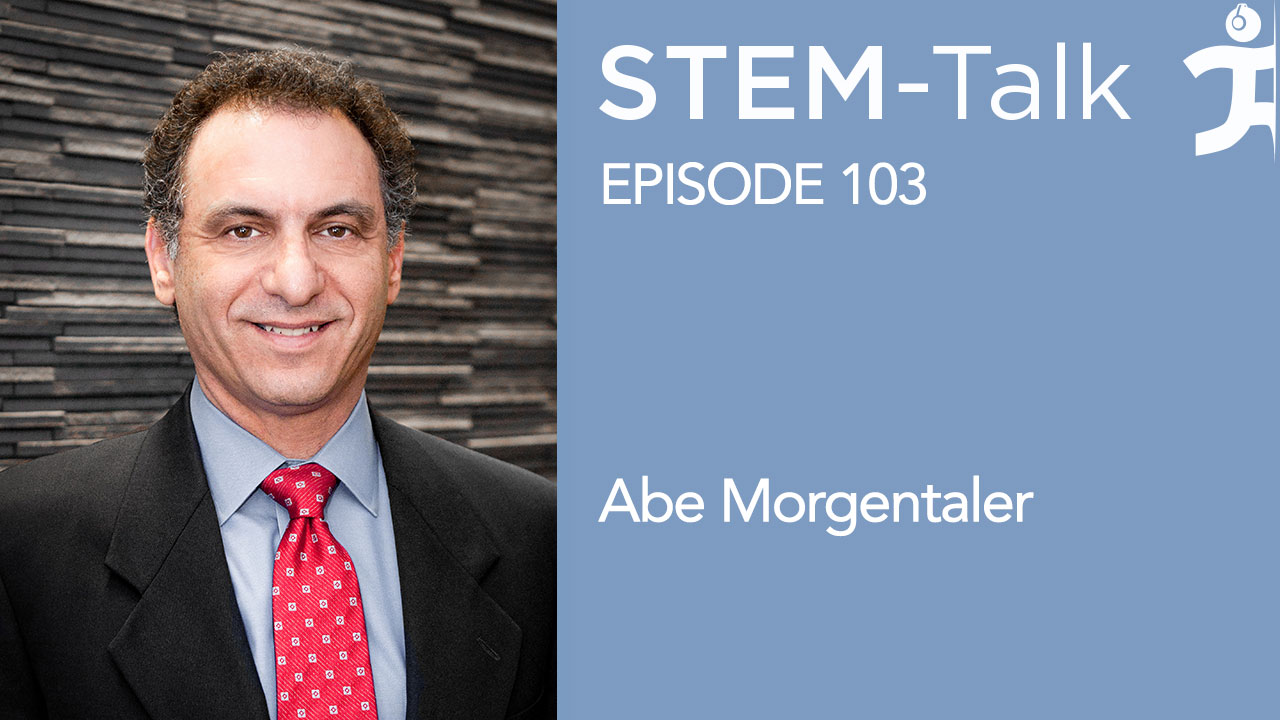STEM-Talk
Episode 103: Abe Morgentaler talks about men’s health, sex drive and the benefits of testosterone therapy
// Feb 18, 2020

Today’s interview is with Dr. Abraham Morgentaler, an internationally known pioneer in men’s sexuality and the founder of the first comprehensive center in the U.S. specializing in men’s health.
Abe’s research has upended longstanding concepts regarding testosterone therapy, prostrate cancer and male sexuality. He is particularly credited with research that has contradicted the established view that testosterone injections led to elevated risks for prostate cancer.
In today’s interview, we talk to Abe about testosterone deficiency and its effects on men’s health and sex drive; the biological functions of testosterone; and Abe’s work treating metastatic prostrate cancer.
Abe is the director of Men’s Health Boston and an associate clinical professor of Urology at Harvard Medical School. He is the author of “Why Men Fake It: The Totally Unexpected Truth About Men and Sex,” which was retitled “The Truth About Men and Sex” for the paperback edition. He also is the author of “Testosterone for Life: Recharge Your Vitality, Sex Drive, Muscle Mass and Overall Health.”
Show notes
[00:02:58] Dawn opens the interview mentioning that Abe grew up in Canada, asking him what his interests were as a kid other than hockey. [00:04:28] Dawn asks what Abe’s gap year between high school and college was like. [00:07:48] Abe explains that when he was born, his mother had some specific wishes for him. He failed at one but came through on the other. [00:08:17] While a sophomore in college trying to find his way, Abe ended up studying sex hormones in lizards. [00:16:32] Dawn explains that for a long time the greatest fear related to the use of testosterone therapy was that it would lead to prostate cancer. This was based on a 1941 paper by Charles Huggins from the University of Chicago, who wrote that his research found cancers were sensitive to hormonal manipulation. Dawn asks Abe to discuss how he started questioning this long-held dogma that high testosterone levels caused prostate cancer. [00:23:29] Dawn mentions that this story is a great example of why it is important in science to question things, particularly the status quo. [00:31:50] Abe talks about his 2006 paper, “Testosterone and Prostate Cancer, a Historical Myth,” which showed that the data contradicted the old belief that more testosterone would lead to more prostate growth. [00:40:10] Ken mentions that Abe followed up his previously mentioned paper with another one titled, “The Saturation Model and the Limits of Androgen-Dependent Growth.” [00:45:19] Abe talks about the exciting work he is doing helping men deal with metastatic prostate cancer. [00:51:32] Dawn explains how Abe uses the term “low T” to describe a condition that is otherwise known as hypogonadism or testosterone deficiency syndrome. Abe describes the many biological functions of testosterone. [00:53:27] Abe responds to the criticism that because testosterone levels decline with age, the process must be natural and, therefore, should not be treated. [00:55:42] Abe discusses a paper that came out in 2013 in the Journal of the American Medical Association that reported increased cardiovascular risk in men given testosterone replacement, and how the study’s statistical analysis was seriously flawed. [01:07:03] Ken mentions that in 2017, a trial by Budoff et al., published in JAMA, suggested that testosterone replacement therapy in men with low T led to more rapid progression of atherosclerotic plaques compared to placebo. [01:13:21] Ken asks why Abe thinks that testosterone replacement therapy can actually be protective in regards to cardiovascular disease. [01:14:19] Ken asks about the seemingly rapid drop in testosterone levels in men in the western world as reported by several papers including the Massachusetts Male Aging Study, as well as a large Finnish Study, and a 2017 meta-analysis. [01:17:37] Dawn mentions that while most people are aware of the term menopause, most are less familiar with the term andropause, coined as the male equivalent. [01:20:41] Abe explains why blood tests for low T can be deceiving, and alternative tests that produce more practical results. [01:25:55] Dawn asks about Men’s Health Boston, which Abe founded in 1999, which was the first comprehensive men’s health center in the United States. [01:29:18] Ken asks about the different modes and types of testosterone administration. [01:33:21] Ken asks about the fears of the aromatization of testosterone to estrogen with replacement therapy. [01:36:14] Ken asks if there are any studies looking into “super physiological” levels of testosterone, such as levels up to 2000. [01:39:22] Ken mentions that in Abe’s book “The Truth About Men and Sex,” Abe explains that his attempt was to pull back the curtain to reveal men as they truly are, the last chapter being titled, “Men Are People, Too.” [01:43:19] Dawn asks Abe what he likes to do in his spare time. [01:45:36] Dawn mentions that Abe was 18 when he entered Harvard as a freshman, and asks him if he had any idea that he would still be at Harvard more than four decades later.





